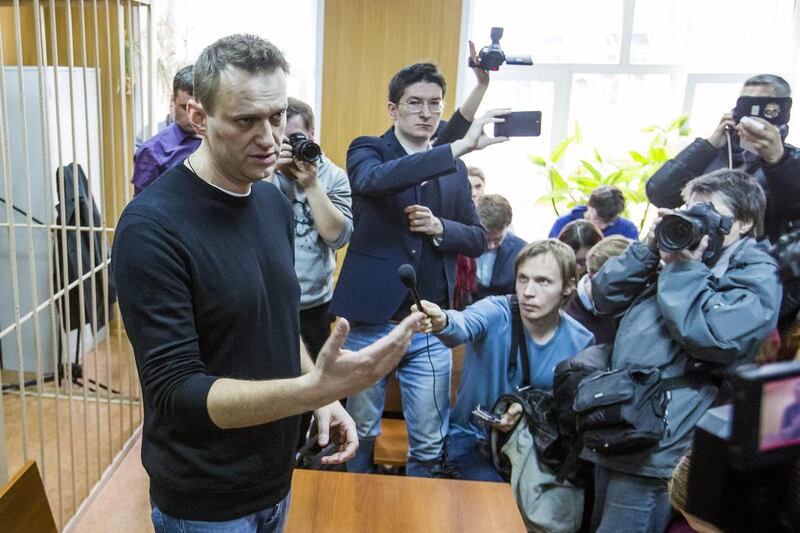MOSCOW // Russian opposition leader Alexei Navalny was sentenced to 15 days behind bars and fined on Monday after staging the biggest anti-corruption protests in years, an act branded a “provocation” by the Kremlin.
The United States and the European Union voiced deep concern after Mr Navalny and more than 1,000 others were detained in the Moscow protest on Sunday, with the state department describing the arrests as as an “affront to democracy”.
A Moscow district court ordered Mr Navalny to serve 15 days in jail after finding him guilty of disobeying police orders. He was fined 20,000 rubles (Dh1,300) for having organised an unsanctioned protest.
The 40-year-old lawyer turned activist, who has announced plans to run for president next year, called Sunday’s protests after publishing a report accusing prime minister Dmitry Medvedev of controlling a property empire through a shadowy network of non-profit organisations.
“The authorities are being accused of multi-million theft, but they remain silent,” a haggard-looking Mr Navalny said in court, insisting the protests were legal.
“More than 1,000 people were arrested yesterday but it is impossible to arrest millions,” he said.
About 7,000 to 8,000 people demonstrated in Moscow on Sunday, according to police figures, making it one of the biggest unauthorised rallies in president Vladimir Putin’s 17 years in power.
The Kremlin called the protest “a provocation and a lie”, and claimed minors had been promised “financial rewards” to participate.
Demonstrations were held not just in Moscow and Russia’s second city Saint Petersburg but also in a number of provincial cities where protests are rarely seen.
They attracted a significant number of minors born since Mr Putin came to power.
“I am very happy that a generation that wants to be citizens, that isn’t afraid, was born in the country,” Mr Navalny said.
Kremlin spokesman Dmitry Peskov said Russians’ “civic stance” would be respected if expressed legally but, without mentioning Mr Navalny by name, suggested “some people will continue using [politically] active people ... to their own ends, calling them to illegal and unauthorised actions”.
The protests drew comparisons with mass anti-government rallies that swept Russia in 2011 over vote-rigging after a parliamentary election, which snowballed into the biggest challenge against Mr Putin since he took power in 2000.
Mr Navalny said he was “proud” of the demonstrators.
“You are the country’s best people and Russia’s hope for a normal future,” he tweeted.
* Agence France-Presse





